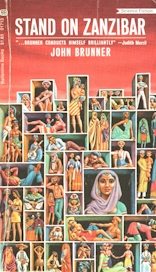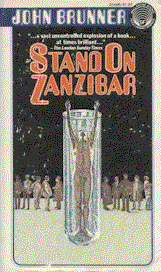
Winner 1969 Hugo Award for Best Novel
Ballantine Books paperback 1st printing (left)
Ballantine books paperback 1970s edition (right)
both 650 pages

Denver Science Fiction & Fantasy Book Club |

|
Stand on Zanzibar (1968) Winner 1969 Hugo Award for Best Novel Ballantine Books paperback 1st printing (left) Ballantine books paperback 1970s edition (right) both 650 pages |

|